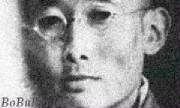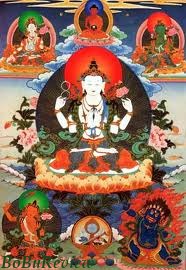...Sex, Orgasm & Spiritual Healing, as translated
by the estimable Jeffrey Hopkins  This controversial book by a very controversial Tibetan Buddhist monk,
Gedun Chopel, is nonetheless a classic of Tantric Buddhism. Chopel's main thesis is that passion is a release from limiting
thoughts and thus things like sexual play, ecstatic orgasm and sexual pleasure are all legitimate components of the spiritual
path -- for householders if not monks. Chopel was regarded as brilliant and eccentric in his milieu of scholarly, monastic
Tibet in the early 1900's. His own passionate proclivities led him to explore aspects of tantric sexual yoga as inseperable
from a strong sense of Buddhist ethics. One of the more unusual,
and charming, images from Chopel's Treatise on Passion, is that we all have gods and goddesses dwelling inside us that can
give rise to supreme bliss. "During orgasm the subtlest and most powerful of all consciousness . . . manifests, albeit
unconsciously to the untrained." If we do train, however, we may be able to distinguish between gross, subtle, and very
subtle consciousness.  "The intent of using a blissful, orgasmic mind in the spiritual
path is to manifest the most subtle level of consciousness, the mind of clear light, and use its greater power . . . to realize
the truth of the emptiness of inherent existence." Gedun Chopel was
so far ahead of his contemporaries that he was a virtual outcast in his own time and place, causing him to journey to India
and other places in search of his own truths. Bringing his background as a monastic to the arena of passionate sex was a daring
undertaking. But he never lost his vision of combining the arts of love with the art of transcendence. "Sex . . . can
become a practice through which [the] exaggeration of the status of appearance and mind is identified and subsumed in the
source state."  Chopel even went so far as to undermine
the differences between spiritual faith and sexual desire. "Without desire, the involvement in the bliss consciousness
would be minimal, and thus Highest Yoga Tantra makes use of the 64 arts of love-making to enhance the process." Much
of Chopel's Treatise on Passion is based on the Kama Sutra, but he actually elaborates in many areas, most especially including
the equality of women, his insistence on which also marks him as a ground-breaker. He never forgets the importance of putting
the woman's passionate arousal first since upon it depends the true transcendence of the sex act. Otherwise, "humans
are reduced to the level of dogs who do it in the street," as he says. "According to standard Buddhist doctrine, it is religion that brings solace [from the
sufferings of the world]." Gedun Chopel's provocative point is that a loving relationship is like religion in that it
brings some relief from pain. This insight must be coupled with the caveat that using sex, like anything else, to block awareness
of suffering is only denial and will not grant a sublime state. "Association with a mate, brought to one by the power of previous actions (karma) --
with love like that for one's own dear life and with abandonment of intrigues and adultery, is the best of ethics."
Tibetan Arts of Love is not a dry scholarly tome, however, and is
filled with explicit sexual techniques, including classifications of male and female genitalia, the use of erotic noises,
biting, pinching and slapping to arouse one's sexual passion and even role reversal. All in service to the one true
aim of conscious orgasm, which could then produce the mind of clear light through sexual ecstasy
|
|
|

